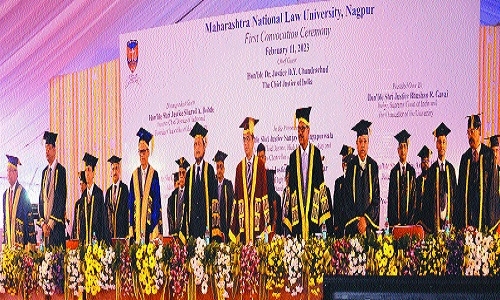Make inequality a thing of past: CJI Chandrachud
| Date :12-Feb-2023 |

Staff Reporter
Lamenting that the deep inequality, which fractured Indian society at the time of independence, persists even today, Chief Justice of India Justice D Y Chandrachud exhorted young law graduates to inculcate constitutionalism in the society to make inequality a distant dream of the past.
CJI Chandrachud was speaking as chief guest at the first convocation ceremony of Maharashtra National Law University (MNLU). Justice Sharad Bobde, ex-CJI and the Founder Chancellor of the University, Justice Bhushan Gavai, Judge, Supreme Court of India and Chancellor of the University, Justice Sanjay Gangapurwala, Acting Chief Justice, Bombay High Court and the Pro-Chancellor of the University, Prof Dr Vijender Kumar Vice-Chancellor of the University were present on the dais. Quoting Shakespeare on the sweet sorrows of parting with their alma mater, Justice Chandrachud encouraged the young graduates to be guided by the constitutional values in the professional life assuring them that “you will not fail.” “As citizens of India and as lawyers, it is our duty to ensure that our fellow citizens are citizens in substance and in the true sense of the word and not merely on paper,” the CJI said.
Asking to ensure social, economic and political justice for all, the CJI said that secure justice for all should be the mission. “Never forget the difference between justice and charity,” he stated and went on differentiating between justice and charity. “Justice is firmly rooted in the conception that all people possess certain inalienable rights. Charity on the other hand is premised on the greatness of the person who is charitable,” the CJI stated.
Justice Chandrachud asked the budding lawyers not to consider their work as charity but consider it as a responsibility for creating an environment in which justice can be dispensed to the citizens. “We sometimes forget that the etymology of word empower is the word power. Charity does not empower communities or redistribute power to create just world,” he said, adding that in contrast, the very purpose of justice is to destroy the very need for charity itself. “Charity is a weak substitute for the full availability and exercise of human rights. Commit yourself to the path of justice. And if you are able to touch even a single soul you will succeed beyond measure,” the CJI claimed. Speaking on the Constitution, the CJI said the success of constitution was generally viewed from two opposite ends of the spectrum. “When the constitution is viewed from the context it emerged from, it is nothing short of remarkable,” he said. The constitution has made tremendous strides towards a more democratic society but much work remains to be accomplished before we can rest, he added.
The CJI quoted celebrated South African Judge and freedom fighter Albie Sachs’ book ‘The Strange Alchemy of Life and Law’ in which the author speaks about rational discriminating regime in South Africa and realignment of law with justice. “The realignment of law with justice is not just one of enterprise which is restricted to a particular country, region, instance or time. It is a constant struggle that evolves in the society,” he said and added, “Even after the law realigned with justice, we wait for the society to catch up.”
Reminding the dual duty as citizen and a lawyer to the young graduates, Justice Chandrachud said, “You are often confronted with situations where you must choose between saying or doing nothing. I must warn you, saying or doing nothing is probably a safer, less riskier option. But choosing the more difficult option is to attempt to make a difference.”
The CJI recalled unimaginable adversity faced by Dr Babasaheb Ambedkar and said that despite adversity, the father of the constitution went on to become the most towering personality of the country.
Speaking on lethargy of the law, the CJI said, “The unfortunate nature of the law is that the law is lethargic and filled with inertia. You will find a million excuses when you become a lawyer and go on to become judges to be an inert individual,” the CJI told the budding lawyers. “When it comes to constitutional values and nurturing a constitutional culture. Be ahead of the curve and live by your own examples,” he advised.
In his address, Justice Bhushan Gavai said that this day would be remembered as a milestone in the history of MNLU. He expressed satisfaction over completing the construction work of Phase 1 of the University campus.
V-C Dr Vijender Kumar read out the annual report of the University.
Justice Sunil Shukre, Administrative Judge, Nagpur Bench of Bombay High Court, Justice A S Chandurkar, Judge, Nagpur Bench of Bombay High Court, Justice Anil S Kilor, Judge, Nagpur Bench of Bombay High Court, Dr Ashish Dixit, Registrar and others were present on the dais.
Graduates and Awards
THE University conferred 220 degrees including 158 undergraduate degrees B.A.LL.B.(Hons) Batch 2016 and 2017, 56 LLM One Year Post Graduate Degree Courses of Batches 2016, 2017, 2018, 2019 and 2020 and six PhD degrees. In total 28 gold medals were awarded to the graduating students.
Four gold medals each were conferred to Advaya Hari Singh and Aditi Tripathi, both BA LLB students. Avani Dubey, Anshi Joshi, Divyanshi Shrivastava, Arpit Lahoti, Sumit Bamhore, Swapini Waware, Aprita Tandon, Shivam Gaur, Pritee Deotale, Aishwarya Tiwari, Sughosh Bhamore, Srijan Mishram, Ankita Verma, Simranjeet Kaur Muchhal, Pallavi Tiwari, Harshit Adwani, Ayushi Tyagi, Gauranshi, Agarwal Rahul Mohan and Ashwin Hirulkar also received gold medals at the maiden convocation.
